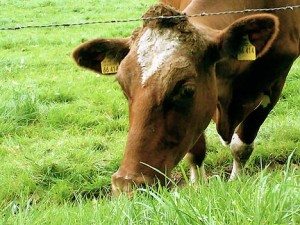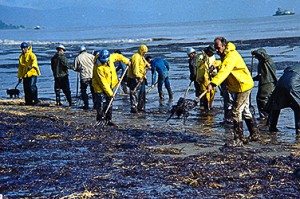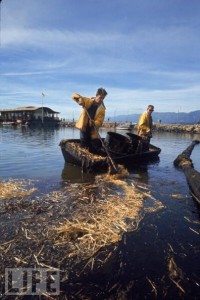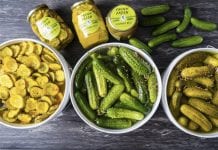 By: Molly Rovero, LuxEco Editorial Assistant
By: Molly Rovero, LuxEco Editorial Assistant
Skeptics would say that Darryl Carpenter and Otis Goodman of C.W. Roberts in Florida did not thoroughly think their idea about using hay to clean up the gulf oil spill through fully. While there may be aspects of their plan still not totally fleshed out, these innovators have started the conversation for an eco-friendly solution to clean-up the spill. The conversation must be continued as it is not enough to stop the spill but we must also protect the environment and and BP does not seem interested in helping the environment.
Their current response to the disaster labeled as the worst spill in U.S. history (even worse than when the Exxon Valdez oil tanker dumped millions of gallons of oil into the Alaska’s Prince William Sound) is to dump chemical dispersants into the water. This fails to truly clean up the oil and spreads it out instead. Additionally, it is adding more substances into the water that could have seriously negative effects on marine and coastal wildlife.
BP’s main focus is to stop continuous stream of oil still dumping thousands of gallons into the gulf daily, but they should really be thinking about the harm being caused to the entire area and start on efforts to clean up what is already in the water which is encroaching on the coastlines and threatening endangered wildlife.
 It is easy to be skeptical about whether hay is a viable option for use in cleaning up the oil. Initial reactions might question weather Carpenter and Goodmans’ demonstration, done in small metal tubs, would have the same effect on areas as vast as the oil has extended in the gulf coast. There is already an answer to this question. Yes. It will work on a larger scale and has been done in the past, specifically to clean up the Santa Barbara Oil Spill of 1969.
It is easy to be skeptical about whether hay is a viable option for use in cleaning up the oil. Initial reactions might question weather Carpenter and Goodmans’ demonstration, done in small metal tubs, would have the same effect on areas as vast as the oil has extended in the gulf coast. There is already an answer to this question. Yes. It will work on a larger scale and has been done in the past, specifically to clean up the Santa Barbara Oil Spill of 1969.
This aside, there are other points to consider. The economic market should be of concern especially in a time when American economy is barely beginning its recovery after a long period where money had become so tight. It is easy to think that a major corporation’s problem does not affect you- especially when it isn’t the banks this time. Prices at the pump have been steady for weeks, but the economic repercussions would not necessarily be a result of the oil spill it self, but potentially from the use of hay if it becomes one of the main methods used in the clean up effort.
Hay, like the corn used in making ethanol, is a farm-based product. Corn-fed cattle had a large impact on prices of every day items at the grocery store, including dairy and meat. Basic economics shows that when the demand is greater the price goes up. Demand for hay could have a similar impact, affecting the prices that people are used to seeing when they shop for their families needs.
There is no simple answer regarding the agricultural economic impact of hay to clean up the oil spill due to the many factors at play. Many farm animals including cows, horses, sheep and goats eat at least one variety of hay as part of their diet depending on the animal. There is no doubt that higher prices would put already struggling farmers in a pinch, potentially causing them to compensate for their losses by raising product prices.
Pricing is not the only aspect to be accounted for. Growing hay requires specific temperatures but the season generally starts in early to late spring. Typically, hay is cut three times in a season. This year’s growing season is barely midway through with many fields only having one cutting of hay under their belts. The United States Department of Agriculture reports showed a light supply of hay for the gulf state of Alabama this past Thursday. Little availability and greater demand would cause prices to skyrocket.
 There is no question that something needs to be done to clean up the oil, while BP sits incompetantly on this front. As far as clean up options, hay has the added bonus of being eco-friendly, unlike Corexit and other dispersants that have already been used in attempts by BP to “clean up”. However, hay may have economic repercussions that should be considered. A multitude of questions arise from this, such as would people be willing to pay higher prices for years to come in order to help clean up a disaster whose effects could last a lifetime? The truth is that there is no perfect solution for this and hay is just one of the many options. Whichever idea is chosen, the important matter is getting the oil cleaned up, even if means sacrificing a few extra dollars during a trip to the grocery store.
There is no question that something needs to be done to clean up the oil, while BP sits incompetantly on this front. As far as clean up options, hay has the added bonus of being eco-friendly, unlike Corexit and other dispersants that have already been used in attempts by BP to “clean up”. However, hay may have economic repercussions that should be considered. A multitude of questions arise from this, such as would people be willing to pay higher prices for years to come in order to help clean up a disaster whose effects could last a lifetime? The truth is that there is no perfect solution for this and hay is just one of the many options. Whichever idea is chosen, the important matter is getting the oil cleaned up, even if means sacrificing a few extra dollars during a trip to the grocery store.













